Bond LSC News
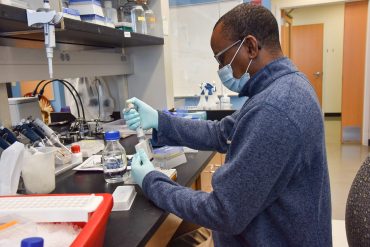
April 14, 2021
Trying to understand amino acid regulation for the good of humanity
Abou Yobi working in the Ruthie Angelovici lab. | photo by Becca Wolf, Bond LSC By Becca Wolf | Bond LSC Many works aimed at improving seed nutritional quality have been faced with limited success because of the lack of clear understanding of how amino acids are regulated. Abou Yobi wanted to get to the bottom of this. Yobi, lab supervisor in the Ruthie Angelovici lab at Bond Life Sciences Center, has been working on understanding how amino acids are regulated in seeds for years. “We can use that understanding to improve seed quality in crop plants so…
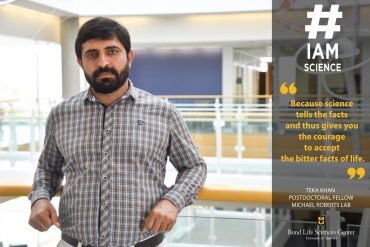
April 9, 2021
#IAmScience Teka Khan
By Becca Wolf | Bond LSC Growing up in the countryside of Pakistan, Teka Khan did not have a science class in high school. In fact, his first science class was in college and it was in English — a language he did not know at the time. “First I had to understand the word meaning. So, what I did for physics, chemistry, and biology is I bought a dictionary,” Khan said. “I had to translate each and every word, and then I had to understand them, so I wrote down the meaning of each word. Sometimes I…
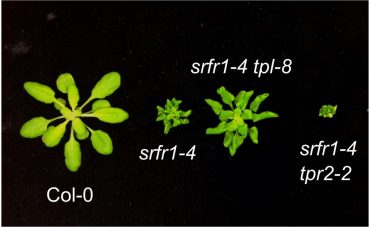
April 7, 2021
Defense or growth: a complicated balance
The figure shows the wild type of the plant to the left. The mutant type to the far right shows when the negative regulator SRFR1 and the TOPLESS gene TPR2 are absent in a plant, the immune system intensifies and the plant stops growing. | Photo contributed by Walter Gassmann, Bond LSC. By Lauren Hines | Bond LSC The plant immune system isn’t active all the time. Plants must decide to either defend against disease or grow, but not simultaneously. The reason behind this process is not fully understood, and the Walter Gassmann lab at…
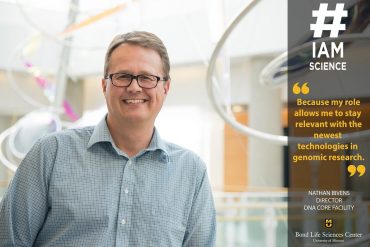
April 2, 2021
#IAmScience Nathan Bivens
By Lauren Hines | Bond LSC With water up to his waist, Nathan Bivens is in his element fly fishing as he waits for a trout to grab onto the end of his line. Bivens picked up this hobby growing up in his hometown of Cassville, which is also where his path to the Bond Life Sciences Center began. The DNA Core Director is the kind of person who will always be there when others need him. “I really enjoy working with a variety of researchers across campus,” Bivens said. “My role and work in a core…
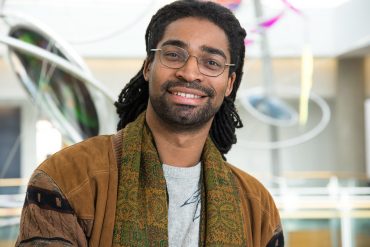
March 30, 2021
Ph.D. botanist inspired to start African American scientists series
Shawn Abrahams | photo by Roger Meissen, Bond LSC By Becca Wolf | Bond LSC Last summer was emotional for many people throughout the country. Movements like Black Lives Matter led many to reflect of the role race plays in society, and to act. Scientists like Shawn Abrahams used that as inspiration to look more closely at what career options are available for botanists, paleobotanists, and plant scientists outside of research. Abrahams felt compelled to capitalize on that energy and inspire fellow minorities. “There’s a rich history of black people being involved in botany and plant taxonomy that…
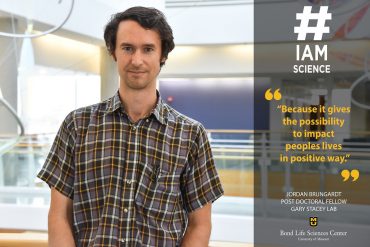
March 26, 2021
#IAmScience Jordan Brungardt
By Becca Wolf | Bond LSC When one hears of a magician, they think of a man that pulls a rabbit out of a top hat or ‘cuts’ people in half. Magicians have a lot of tricks up their sleeve. People do not think of scientists as magicians, yet they still perform wonderous things. “I heard a quote one time that says science and technology is kind of like magic,” Jordan Brungardt said. “For somebody that doesn’t know what is happening, experiments look like magic if they’re performed well. Think of cell phones allowing us to talk to…
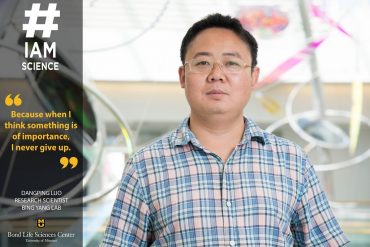
March 19, 2021
#IAmScience Dangping Luo
By Lauren Hines | Bond LSC The greenhouse isn’t a place most researchers linger. With condensation sticking to the glass windows, scientists usually don’t dawdle longer than 30 minutes in the heat and humidity. But Dangping Luo, on the other hand, doesn’t seem to mind and takes his time tending to his rice plants. A research scientist in the Bing Yang lab at Bond Life Sciences Center, Luo, is a man of determination and conviction. For the past 18 years, Luo has been studying rice genetics and its interaction with disease. “When I think something is of…
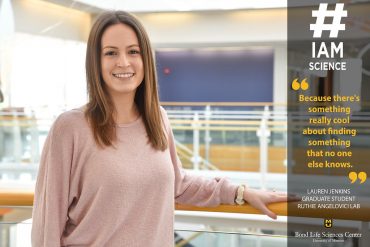
March 12, 2021
#IAmScience Lauren Jenkins
By Becca Wolf | Bond LSC As someone interested in getting a Ph.D., you apply to several schools and programs hoping to get in. When Lauren Jenkins first interviewed with Mizzou, she knew it was the one. But the interview was not the first time she’s had a good impression with the school. As an undergraduate student at the University of Missouri-St. Louis, Jenkins’ first science conference was the Interdisciplinary Plant Group (IPG) Seminar at the Bond Life Sciences Center. “I actually had the opportunity to give a talk there,” Jenkins said. “I just remember being an undergrad…
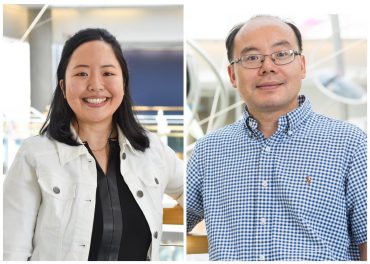
March 10, 2021
Higher Viral Load May Lead to Less Severe Symptoms
Cynthia Tang and Henry Wan | photos by Becca Wolf and Roger Meissen, Bond LSC By Becca Wolf | Bond LSC You would think that the less sick you are, the less contagious you are. That’s just logic. However, science isn’t always logical. Especially with Covid-19. Henry Wan, principal investigator at Bond Life Sciences Center, recently found that when a person has mild symptoms of Covid-19 they have a higher amount of viral shedding. He also found that people with a higher amount of virus on their positive swab test are less likely to be hospitalized than those…
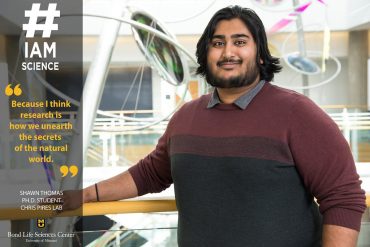
March 5, 2021
#IAmScience Shawn Thomas
By Lauren Hines | Bond LSC Social media botany advocate and self-proclaimed coffee snob, Shawn Thomas is the kind of person to find joy in everything. Thomas graduated from the University of Georgia in spring 2018 and worked as a bioinformatics technician for a year with Jim Leebens-Mack before joining Chris Pires’ lab at Bond Life Sciences Center as a Ph.D. student in fall 2019. Ever since, he’s been studying how genome duplications affect plant traits in a certain group of plants that include broccoli, cauliflower and kale. Genome duplications occur when DNA is…
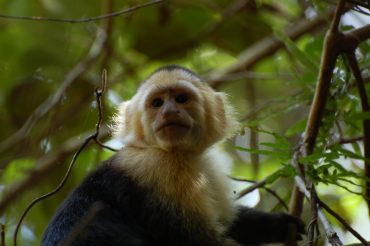
March 2, 2021
Genetic link in primate points to source of adaption and longevity in capuchins
As part of an international collaboration, principal investigator Wes Warren helped study capuchins in Costa Rica. | Photo contributed by Amanda D Melin, Bond LSC. By Lauren Hines | Bond LSC Through monkey poop and three years of work researchers from all over the world sequenced the Panamanian white-faced capuchin genome for the first time and devised novel methods to sequence many more wild capuchin genomes. These monkeys have large brains for their small size and can live past 50. Wes Warren — Bond Life Sciences Center principal investigator — helped sequence the genome to find…
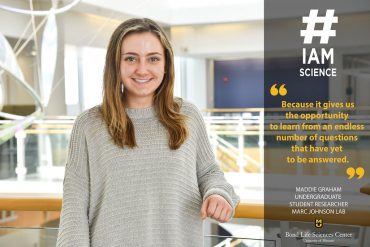
Feb. 26, 2021
#IAmScience Maddie Graham
By Becca Wolf | Bond LSC When the pandemic hit, Maddie Graham’s lab life shifted focus. The junior biomedical engineering pre-med student suddenly started to find answers by extracting RNA out of wastewater to help detect SARS-CoV-2, the virus that causes Covid-19, which reiterated how important science is in our lives. “I don’t think medicine would be anything without research,” Graham said. “I think it’s really important to see the other side of things, understand how things have come to be and how they’ve made these medical advances. It was cool to be able to do something related…